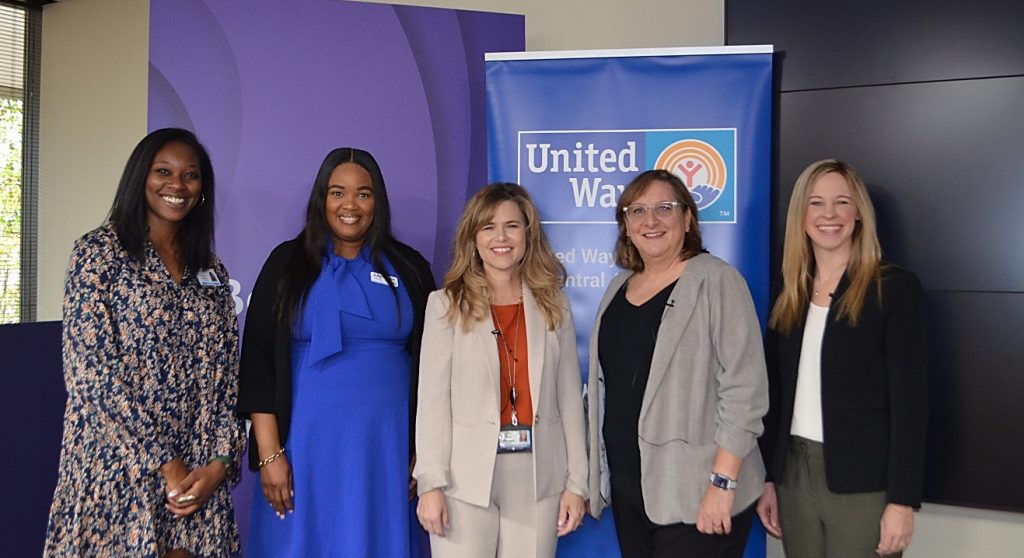The Women United Wednesday series is hosting a three-part program addressing the “State of Our Kids” following the pandemic. The first lunch and learn was held on August 31st and focused on COVID-related learning loss. This second installment took a deeper look at adolescent mental health and how United Way of Central Alabama (UWCA) and its partners are working together to address this growing crisis.
In case you didn’t know, Women United is one of UWCA’s leadership societies through which members donate $1,000 or more to UWCA annually for the purpose of inspiring, educating and motivating women to become positive change-agents within our community through philanthropy, leadership and volunteerism. In addition to making a positive change in our community, members are given the opportunity to network with other local leaders and further engage in United Way’s work, including educational sessions outlining key issues impacting Central Alabama.

The November 9th event was sponsored by Protective and held at its headquarters campus. Shakeitha Tatum, Director of Agency Relations & Allocations at UWCA, facilitated a discussion with the following panelists:
- Tashee Brown, Youth Services Coordinator, Crisis Center
- Emily Herring Bryan, Mental Health Coordinator, Fairfield City Schools
- Cindy Jones, Psychiatric Intake Response Center (PIRC) Director, Children’s of Alabama
- Dr. Melissa Shields, Office of School Improvement Coordinator at Alabama State Dept. of Education
The panelists discussed how COVID-19 affected the mental state of school children. As Cindy Jones pointed out, “There were mental health issues before the pandemic, but it exacerbated these issues.” Isolation mixed with lingering fear compounds the effects of things such as viewing picture-perfect and unrealistic images of other people on social media. Tashee Brown said, “Kids spend so much time alone on their phones, seeing what’s not real. Tell your kids, ‘Your authentic self is the best version of you.’”
Tell your kids, “Your authentic self is the best version of you.”
Tashee Brown
COVID-19’s effects have persisted in other ways, as well. Emily Herring talked about students who told her that they were afraid to be in large spaces such as cafeterias and school hallways. She also shared several moving, anonymous quotes from students, illustrating the very real issues that children face.
One student said, “I have depression, but my family doesn’t believe depression is real. They tell me I’m better off than most.”
Another said, “My mom died of cancer last year. I skipped school because I didn’t want to be there on the anniversary, but no one knew why because I didn’t tell them she died.”
Kids and parents sometimes don’t know the first step in how to seek help, which is why all of the organizations represented by the panelists seek to provide resources and help to the children of Central Alabama, and why UWCA supports these organizations. The warning signs that a child is struggling with mental health issues can vary greatly, but all the panelists agreed that extreme behaviors as well as sudden shifts in behavior warrant a conversation. Dr. Melissa Shields said, “The most important thing we can do as parents, aunts, grandparents, is to ask. There’s a stigma sometimes, so remind them that it’s OK to not be OK.”
“Remind them that it’s OK to not be OK.”
Dr. Melissa Shields
Thanks to the generosity of our donors, UWCA is able to support partner agencies, including Children’s of Alabama and the Crisis Center, that are making a huge difference in the lives of troubled youth every day. We’re also able to convene mental health partners who work together to make a collective impact through our Bold Goals Coalition. And we’re answering the need for additional resources due to the pandemic with $940,000 in Crisis Fund grants going directly to organizations that provide mental health services.
The next installment of the “State of Our Kids” series will be held January 25, 2023 and will be focused on Early Learning and Childcare. Learn more about Women United and how to join important discussions such as these by visiting Women United – United Way of Central Alabama (uwca.org)